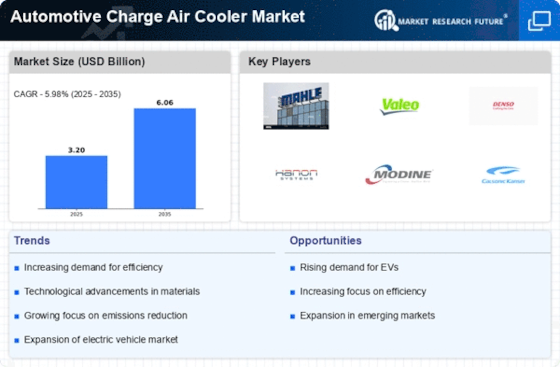Top Industry Leaders in the Automotive Charge Air Cooler Market
 *Disclaimer: List of key companies in no particular order
*Disclaimer: List of key companies in no particular order
Top listed companies in the Automotive Charge Air Cooler industry are:
MAHLE Gmbh
Delphi Technologies Dana Limited
Vestas Aircoil a/s
Bell Intercoolers
Rad Co. Ltd.
Valeo
Spectra Premium
Conflux Technology
Modine Manufacturing Company
Taking the Heat: Exploring the Competitive Landscape of the Automotive Charge Air Cooler Market
In the high-octane world of automotive performance, where every breath of air fuels the engine's roar, the humble charge air cooler plays a crucial role. This multi-billion dollar market hums with activity, a battlefield where established giants, nimble disruptors, and regional champions vie for a share in cooling the turbocharged air for optimal combustion. Let's navigate the key strategies, market dynamics, and future trends shaping this dynamic landscape.
Key Player Strategies:
Global Titans: Companies like MAHLE, T.RAD, and Valeo leverage their extensive experience, diverse product portfolios, and global reach to maintain their dominance. They cater to major automakers, offering advanced charge air cooler technologies like high-efficiency fin designs, lightweight materials, and integrated sensors for real-time performance monitoring. MAHLE's ChargeAir Cooler with Coolant Bypass exemplifies their focus on innovative and optimized cooling solutions.
Technology Disruptors: Startups like CTI Thermal and Hypermotive are disrupting the market with novel technologies like additive manufacturing for complex fin designs, enhanced heat transfer fluids, and digital twins for virtual prototyping. They cater to tech-savvy customers seeking high-performance and lightweight solutions. CTI Thermal's additively manufactured air coolers showcase their focus on innovative and bespoke cooling geometries.
Cost-Effective Challengers: Chinese manufacturers like Beijing Sanden and Hanon Systems are making waves with competitively priced charge air coolers, targeting budget-conscious carmakers in emerging markets. They focus on affordability and basic functionality, offering alternatives to premium brands. Beijing Sanden's wide range of affordable coolers demonstrates their focus on cost-competitive solutions.
Regional Champions: Companies like Denso in Japan and Delphi in North America excel in specific geographic regions, leveraging strong local relationships and deep understanding of regional regulations and customer preferences. They offer tailored charge air cooler designs and service networks specific to their markets. Denso's high-efficiency coolers for Japanese vehicles showcase their focus on regional optimization.
Factors for Market Share Analysis:
Fuel Efficiency and Power Output: Efficiently cooling the compressed air significantly improves engine performance and reduces fuel consumption. Companies offering coolers with superior thermal transfer capabilities gain an edge.
Cost and Affordability: Balancing advanced features with competitive pricing is vital for mass adoption, particularly in cost-sensitive markets. Companies offering affordable coolers without compromising performance or durability stand out.
Durability and Reliability: Withstanding extreme temperatures, vibrations, and pressure fluctuations is crucial for long-term performance. Companies with track records of robust and reliable coolers gain trust and market share.
Weight and Packaging Efficiency: Lighter and more compact coolers improve vehicle fuel efficiency and allow for greater design flexibility. Companies focusing on lightweight and optimized designs cater to this growing trend.
New and Emerging Trends:
Focus on Electric Vehicles: Adapting charge air cooler technologies for electric vehicles with high-performance battery packs and thermal management demands presents significant growth opportunities. Companies investing in EV-specific solutions stand out in this evolving space.
Advanced Materials and Coatings: Utilizing composite materials, nanotechnologies, and anti-corrosion coatings improves heat transfer efficiency, reduces weight, and increases durability. Companies embracing next-generation materials gain an edge.
Integrated Sensors and Controls: Implementing real-time temperature, pressure, and flow monitoring sensors allows for intelligent cooling adjustments, optimizing performance and minimizing energy consumption. Companies offering connected coolers cater to the demand for data-driven solutions.
Focus on Sustainability: Utilizing recycled materials, reducing production waste, and developing environmentally friendly coolants aligns with sustainability goals. Companies promoting green practices attract responsible investors and potential regulatory benefits.
Overall Competitive Scenario:
The automotive charge air cooler market is a dynamic and exciting space with diverse players employing varied strategies. Established giants leverage their reach and diverse portfolios, while technology disruptors introduce innovative solutions. Cost-effective challengers cater to budget-conscious buyers, and regional champions excel in specific markets. Factors like fuel efficiency, affordability, durability, and weight play a crucial role in market share analysis. New trends like EV integration, advanced materials, connected solutions, and sustainability offer exciting growth opportunities. To succeed in this evolving market, players must prioritize innovation, cater to diverse engine needs, embrace data-driven solutions, and explore green practices. By effectively taking the heat off for optimal engine performance and environmental consciousness, they can secure a dominant position in this high-pressure landscape.
Latest Company Updates:
MAHLE GmbH:
- October 2023: Unveiled a new lightweight charge air cooler with improved thermal performance for heavy-duty trucks
Delphi Technologies:
- November 2023: Launched a new line of compact and lightweight charge air coolers for high-performance gasoline engines
Vestas Aircoil a/s:
- October 2023: Secured a major contract to supply charge air coolers for offshore wind turbines
Bell Intercoolers:
- September 2023: Released a white paper on the importance of charge air cooler efficiency for reducing fuel consumption and emissions

